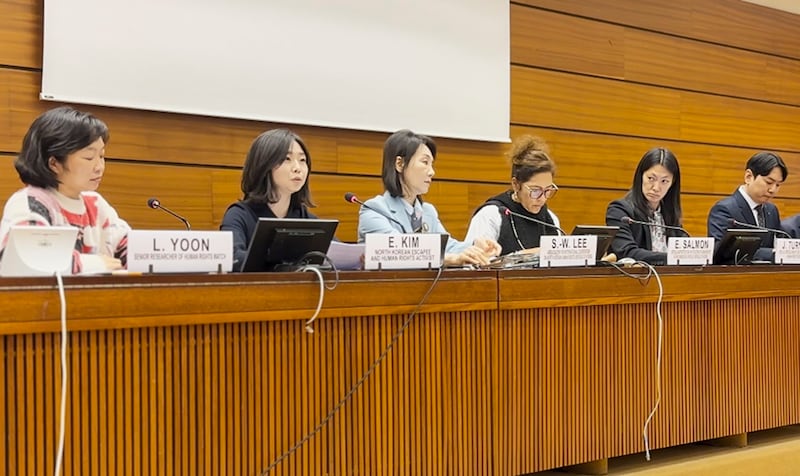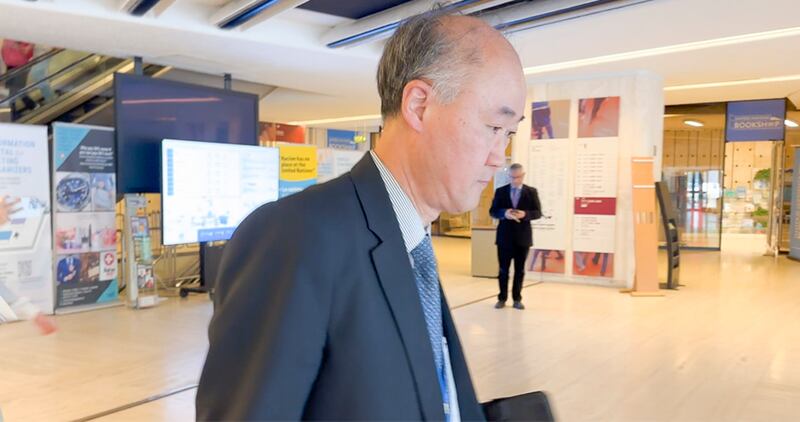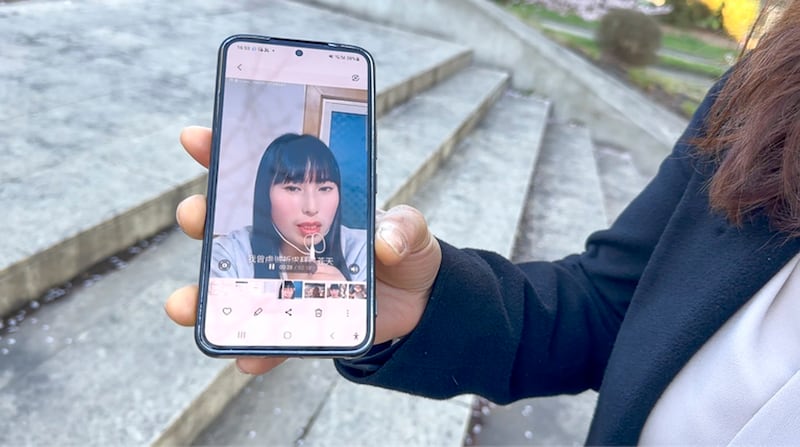Holding back tears, Kim Kyu-li spoke into the microphone to share her sister’s story, pleading with China to stop sending back captured North Korean escapees.
Both were raised in North Korea and fled the country as teenagers – but wound up in starkly different places, she told people gathered at an event hosted by the U.N. Human Rights Council in Geneva on March 15 – one of a series of meetings about North Korean escapees.
Kyu-li escaped to China in 1997 and eventually settled in the United Kingdom.
But her younger sister Chol Ok – only 15 when she fled North Korea a year later – was sold by human traffickers to a Chinese man 30 years her senior to be his wife. She lived with him for 25 years, bearing him one daughter.
In 2023, she tried to flee to South Korea, which welcomes North Korean escapees, but was captured by Chinese police, Kyu-li said. In October, Chol Ok was among 600 North Korean escapees who were forcibly repatriated back to North Korea – where she almost certainly faces punishment, prison or possibly even execution.
Her marriage was not enough to save her because escapees in China are undocumented, and barred from registering life events like marriages and births.
“When my sister decided to escape, I believed she could succeed. I tried to support her in every way,” said Kyu-li. “I thought about going to China and bringing her back (with me to the U.K.), and now I feel bad that I couldn’t do that. I cry every day, and I don’t know what to do.”
‘China is the problem’
Chol Ok’s plight illustrates China’s refusal to recognize North Korean escapees as refugees fleeing persecution.
Instead, Beijing maintains that they are illegal migrants who must be sent back to their country of origin, and that they are bound by two agreements with Pyongyang.
“China is the problem,” Kyu-li told Radio Free Asia. “We need to negotiate with China. I want to say, ‘If you don’t want to accept North Korean escapees coming to China, send them to a third country, don’t send them back into danger.’”
Several diplomats present at the event and officials from human rights organizations said China and North Korea share responsibility for human rights abuses. They urged Beijing to embrace “non-refoulement,” or the refusal to send asylum-seekers back to countries where they may face persecution.
“We also call on member states, including the PRC, which shares a land border with the DPRK to uphold their respective international legal obligations, and to respect the principle of non-refoulement,” Michelle Taylor, U.S. permanent representative to the United Nations Human Rights Council said at the event, using abbreviations to refer to China and North Korea.
No one representing North Korea was present.
China’s representative, Xie Chenchen, walked into the conference late – though it was the first time a Chinese official attended such an event.
Kim appealed for help in front of Xie, saying that her younger sister was at the crossroads of life and death, as would likely spend time in a North Korean prison.
Kyu-li said her older brother lost his life due to torture while imprisoned, and she still doesn’t know where he is buried. She fears the same thing will happen to her sister.
“North Korean jail is very poor,” she said, addressing the conference in English. “People struggle with harsh punishments and starvation. I’d like to get them some help. I came here because of my sister and all North Korean people. Please help them for their freedom.”
She sought permission to continue her remarks in Korean, and appeared to hold back tears every time she spoke.
As the event came to an end, Xie, the Chinese representative, suddenly asked to speak. He read from the two sheets of paper in front of him.
“Persons from DPRK who come to China illegally for economic reasons are illegal migrants, not refugees,” he said. “The principle of non-refoulement under that context does not apply to them. There is currently no evidence of torture or so called massive human rights violations in DPRK. So, the principle of non-refoulement under that context does not apply to them.”
Xie gave no recognition of her testimony about her sister, and scurried out of the event as soon as it ended.
“It hurts. But it was expected, given China’s stance,” she said. “I want to ask how they plan to address China’s illegal acts against North Korean escapees.
“Chinese people are trafficking North Korean people. North Korean escapees have married Chinese people and started families. Most of those forcibly repatriated to North Korea have family in China. What is China going to do about their children?”
‘We reject this attack’
A couple days later, on March 18, international delegates in a U.N. conference room in Geneva discussed the situation in North Korea. Representatives of several states called on China to observe the principle of non-refoulement.
Chinese representative Shi Qi, who attended the meeting, said that mentioning China in the issue of forced repatriation to North Korea is considered an attack on Beijing.
“China is concerned about the report where it mentions the entry into China by the people of DPRK. These people are by no means refugees,” said Shi. “They have violated Chinese law and Chinese immigration control order. We reject this attack by countries, including the USA.”
The next day, the Permanent Mission of the Republic of Korea to Geneva hosted an event to commemorate the 10th anniversary of the UN Commission of Inquiry on Human Rights in North Korea.

Kim Eunju, a North Korean escapee, said that in 1999, at the age of 12, she escaped to China with her mother and older sister – and immediately became victims of human traffickers.
In 2002, they were discovered by police and repatriated to North Korea.
While in prison, Kim was subjected to hard labor and witnessed the suffering of other inmates, she said. But she managed to escape to China that same year, then made her way to South Korea in 2006.
Meeting other escapees such as Kim Kyu-li has given her the courage to tell her story, she said. She said she felt a special bond just from the way they looked at each other.
“As someone who experienced forced repatriation to North Korea, I felt so empathetic to what Kyu-li’s sister is going through,” she said, adding that it made her cry. “There is a bond of sympathy. When you look at the people who were forcibly repatriated to North Korea, there is a common anger toward the North Korean regime.”
“Forced repatriation is not just a problem in the past, but still an ongoing problem,” Kim Eunju said. “That’s why I will speak up.”
Mind your own business
On March 20, North Korea’s acting ambassador to the UN Office at Geneva, Bang Kwang Hyuk, who was absent during discussions on North Korean human rights issues, entered the conference room as the general debate on human rights began.
He read a four-page-long prepared statement saying the U.N. Human Rights Council must pay attention to the serious human rights situation in the United States and Western countries.
He mentioned the United States 11 times, saying that it is the “main culprit of the crimes against humanity where all sort of social evidence and institutional human rights abuse is talked about, including deep-seated racism and incurable gun-related crimes.”
He was also critical of Japan and South Korea, and said that the criticism of North Korea or China was an attempt to use the human rights council as “interference in the internal affairs such as Xinjiang, Tibet, Hong Kong in China as well as Belarus, Iran, Nicaragua, Russia, Syria and Venezuela.”

As he exited the conference room, RFA reporters repeatedly asked Bang about the situation facing the forcibly repatriated North Koreans as they followed him to his car outside the building, but he did not acknowledge them and drove away without responding.
Kim Eunju told RFA that the refusal of China and North Korea to acknowledge the forced repatriation issue angers escapees.
“Forced repatriation starts in China and ends when China stops,” she said. “By stopping forced repatriation, many of the human rights issues of North Korean women who are trafficked and sexually assaulted in China could be addressed.”
Unmailable letters
On the weekend, the sunny weather drew Kim Kyu-li into Geneva’s streets.
Entering the International Red Cross Museum across from the United Nations building, the first exhibit she saw was on “Restoring Family Links.”
“Human beings are social beings who are defined by their links with others,” the plaque describing the exhibit said. “When those links are broken, they lose part of their identity and their bearings. Giving and receiving news and finding one’s loved ones again are elements of stability that are even more essential during crisis situations.”
As she read the description, tears welled up in her eyes. “I’m glad I came,” she said.
Amid the faces of countless people separated from their families by war, her gaze stops at the handwritten letters to the loved ones they long to see.

“I wish I could write a letter to my sister and that she could receive it,” she said. “I think she’ll cry if I say, ‘I miss you.’ So, there’s nothing else but to say ‘endure’ ... ‘survive.’ She must survive so we can meet again. She probably feels like dying right now.”
In her heart, she writes hundreds of thousands of letters that cannot be sent, she said. If she meets her sister again, her only wish is to travel around the world and eat lots of delicious food together.
She reminisced about how when they were young, their mother made mandu, Korean dumplings, for them, and how happy they were to eat them together.
"When I meet my sister, the first thing I want to feed her is mandu," she said.
The exhibit makes her long to see her sister, so she scrolls through her cellphone to find the last texts, pictures and videos they sent to each other.
“Every time we talked, she would always sing a song and send it to me,” she said, showing a video of Chol Ok singing in Chinese. “She said she sings to ease her loneliness. This video was taken two years ago. She sings so well and her voice is lovely.”
Translated by Claire S. Lee and Leejin J. Chung. Edited by Eugene Whong and Malcolm Foster.
